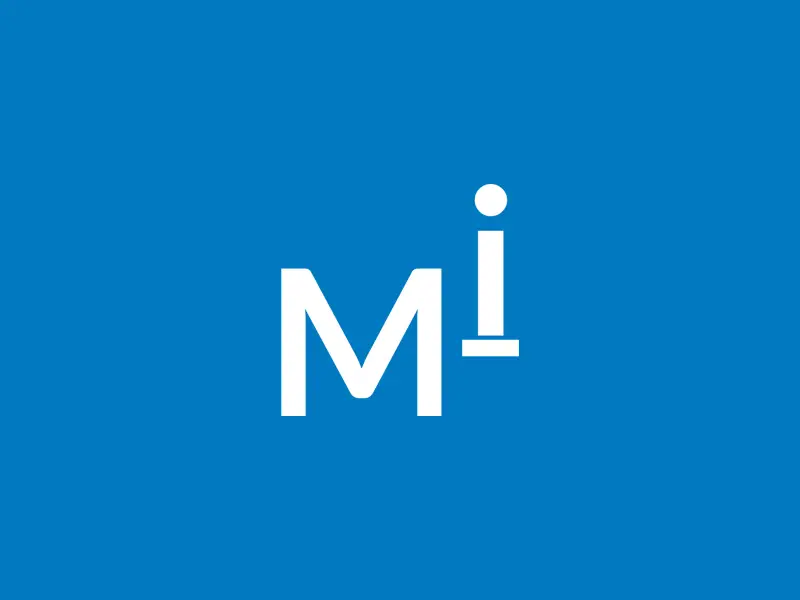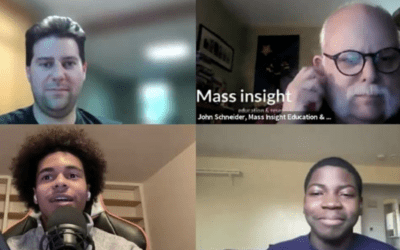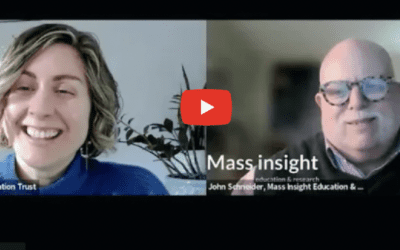What does the evidence say about how schools can improve the adolescent literacy crisis happening in our country? In this webinar, we explore the Institute of Education Sciences Reading Intervention Guide for Grades 4 through 9, found here, and diving into two of the...
Recentering Our Communities in School Transformation: An Equity-First Approach
This is the final post in Mi’s Revisiting the Turnaround Challenge blog series. In Revisiting the Turnaround Challenge, we examined the outcomes of three “turnaround zones” implemented by urban public school districts in partnership with Mi between 2012-2019. Our goal was to learn from our past work to help school and district leaders and State Education Agency staff accelerate pandemic recovery in low-performing schools and begin the difficult task of reinventing public education to better serve systemically marginalized students.
A critical lesson from our recent studies is that the concept of “turnaround” in underperforming schools is a misnomer. Lasting improvement takes time, as the challenges are deeply embedded within the fabric of education, and change management is intricate. It’s clear that we need to pivot from the notion of turnaround to a more profound transformation if we’re to make any real progress. This holds true especially in the wake of the pandemic’s exacerbation of existing disparities rooted in race, ethnicity, socioeconomic status, language, and ability.
In addition, to serve systemically marginalized students effectively, our schools and districts must not only operate differently but also aim for different outcomes. This requires an equity-first approach to school improvement. As we look to the future, we must think differently about how we partner with families and school communities to innovate as a coalition. Doing the same things under a different name will not suffice. We invite you to consider the possibilities.
Imagine a world where…
- school community members (students, families, teachers, staff, and decision-makers) come together to reflect on data and analyze problems.
- we collectively arrive at solutions, design a plan, and solve the challenge as a collective.
- we leverage the genius and contributions of each person impacted by the educational system.
- we create inclusive spaces for communities to lock arms and build a new day.
Imagine a movement of shared ownership. This world is possible!
To respond to the needs of schools and districts, Mi offers Equity-First Transformation, a suite of services designed to support systems level transformation that meet the moment and address the current realities educators and students face.
Why Equity-First Transformation (EFT)?
At the heart of Mi’s EFT is the desire to collaborate with schools, districts, and other education organizations, fostering partnerships to design educational experiences that marginalized students not only need but rightfully deserve. EFT serves as a clarion call for stakeholders – educators, students, parents, and community members – to co-create sustainable educational strategies rooted in justice and equity.
What is Equity-First Transformation (EFT)?
EFT advances the approaches to school improvement, building from insights gained through the Turnaround Challenge, providing a targeted, in-depth, systemic emphasis on equity. Here’s how EFT responds differently:
- Phase 1 Equity Accelerator: Identifies the root causes of inequitable student outcomes with a rigor that extends beyond the Turnaround Challenge’s initial scope. By anchoring our interventions in an explicit equity lens, the Equity Accelerator sets the stage for meaningful and sustainable change.
- Phase 2 Community-Driven Strategic Planning: Deepens the collaboration between educators, students, parents, and other community stakeholders to formulate strategic priorities that are directly informed by the community’s needs and aspirations. While the Turnaround Challenge brought schools together for support, EFT forges a stronger alliance for systemic change through shared ownership.
- Phase 3 Implementation Support: Brings to life the community’s co-created solutions, entering a phase of actualization, and sustained improvement. EFT echoes the Turnaround Challenge’s commitment to capacity-building but with an evolved focus on long-term outcomes and adaptability driven by stakeholder voices.
EFT not only addresses the challenges spotlighted by the Turnaround Challenge but also advances our response to them. It’s a strategy that re-envisions the allocation of resources, people, time, money, and programs, to favor an equity-centric and inclusive model. Through EFT, we’re not just recovering from pandemic disruptions; we’re propelling our schools toward a future where equity is the bedrock of educational excellence. EFT creates the conditions for co-created solutions to build an education system where all students, irrespective of their background, receive the education they rightfully deserve.
Click here to return to the first blog post in this series.

Recent Posts
AP On-Track Framework Walkthrough — Webinar
Throughout the school year, AP students face crucial moments on their path to the AP exam. Mass Insight has developed a comprehensive roadmap to assist teachers in helping students build the academic and non-academic skills necessary for success in their AP classes....
AP Equity Self-Assessment Walkthrough – Webinar
Does your school monitor AP data through an equity lens? Is there an open enrollment policy for AP courses? How do you support students transitioning into AP? Watch our recent webinar below, where Mass Insight's team guide you through the AP Equity Self-Assessment...
You may also like
An Interview with Mass Insight AP Students and their Teacher
https://youtu.be/mQTeW8-sX40 We sat down with two Mass Insight AP STEM & English Program students, Ben and Chris-Ander, and their teacher, William Pellegrino, to hear about their educational journeys, their experiences in AP classes and as vocational students, and...
An Interview with Kristen Hengtgen of The Education Trust
https://youtu.be/1ZfxNShHJOU?si=d1a1GoVrgrDWT5Cu Kristen Hengtgen, Ph.D. is a senior analyst on The Education Trust's P-12 policy team and co-author of their new report, Increasing Access to Advanced Coursework in Massachusetts. In this interview, she joins Mass...
Creating the conditions for greater success of systemically disadvantaged students in AP: Next steps for the Massachusetts AP STEM & English program
Recently the New York Times published an article entitled, Why is the College Board Pushing to Expand Advanced Placement? The article focuses on an important issue: there’s been greater growth in AP participation for Black and Latino students and students living in...



